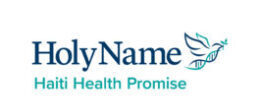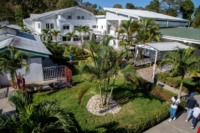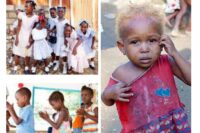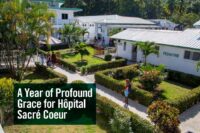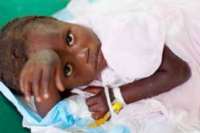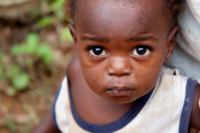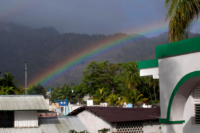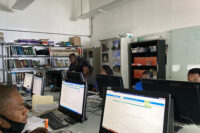By The Rev. David Hurst
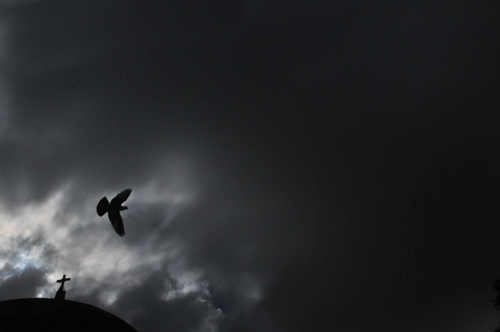 Through my sabbatical experience at Hôpital Sacré Coeur this winter I have been asked to write an article for Bon Nouvèl about something spiritual that happened to me in Haiti. I don’t know where to start! In all our knowledge and American knowhow, which I too have a full blessing of; we think we might know how God’s work is done. We assume that our way is the best way. That the accomplishment of our ideas will bring about change quickly and easily without the need of a tremendous amount of give and take. But if we assume the results of God’s work, the gift of working together in all its facets, we really underestimate God’s power and the range into which we involve ourselves in his goodness and his service.
Through my sabbatical experience at Hôpital Sacré Coeur this winter I have been asked to write an article for Bon Nouvèl about something spiritual that happened to me in Haiti. I don’t know where to start! In all our knowledge and American knowhow, which I too have a full blessing of; we think we might know how God’s work is done. We assume that our way is the best way. That the accomplishment of our ideas will bring about change quickly and easily without the need of a tremendous amount of give and take. But if we assume the results of God’s work, the gift of working together in all its facets, we really underestimate God’s power and the range into which we involve ourselves in his goodness and his service.
I went to Milot with the charge of helping Tim Traynor with construction projects and to help out where I could be of service. For me it was a time away from my church, to reenergize and to roll up my sleeves away from the pulpit and see how others do God’s work in such a remote place. I knew in my heart that God would provide me with ample opportunity to help those who needed reassurance and God’s love. But I wondered how that would go and how things would be, but I soon became part of it all.
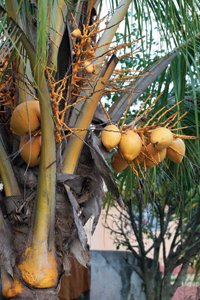 Immediately, even on the Sunday I arrived, I became caught up in the everyday triage of a hospital, the everyday rollercoaster ride of getting medical machinery to work and be maintained. Encountering and beginning to bond with workers I had to insist upon following through with projects and accomplishing the whole reality of getting things done. I was confronted with finding parts, dealing with the frustration of setbacks, the heat and the differences in cultures. And then of course, God’s part, setting things in motion, doing one’s bit and then leaving it to unfold through God’s grace and not playing the judge of the results.
Immediately, even on the Sunday I arrived, I became caught up in the everyday triage of a hospital, the everyday rollercoaster ride of getting medical machinery to work and be maintained. Encountering and beginning to bond with workers I had to insist upon following through with projects and accomplishing the whole reality of getting things done. I was confronted with finding parts, dealing with the frustration of setbacks, the heat and the differences in cultures. And then of course, God’s part, setting things in motion, doing one’s bit and then leaving it to unfold through God’s grace and not playing the judge of the results.
On the ground there was little time to muse. You have to move on to the next need to be met! Then, move on to the next day with a new set of challenges and trials. Confronted with the drawbacks of Haiti and the overwhelming needs of people, I soon became a witness to a huge amount of very good work, planned and set in motion: done with love, and with the blessing and the quiet assent of those around me both Haitian, American and those from a number of other countries and places. Father Tijwa, the priest of the village church did me the great honor of asking me to preach in this beautiful domed church. I was amazed by the invitation and honored to be there. I saw society trying to live and progress. I learned that life is the same for all of us. People aspire to live together, to love one another and to raise their families and take care of each other both young and old. There are hard choices and drawbacks, overcome through reliance upon a power greater than ourselves.
Dr. Stephen Fletcher commented one night on the porch that, “in Haiti, life is three steps forward and two steps back.” Those who come year after year and donate their time, their resources and their expertise, see the progress over time. They have the advantage of the long view and see that immerse progress has been made in so many areas and that the hospital becomes more and more a part of the village life.
One night on the porch Dr. Prévil happily told us his account of the weekly, volunteer experience for the hospital crews and people who come to serve CRUDEM/Hôpital Sacré Coeur. Sunday the teams arrive and perhaps see emergency situations in the hospital. But the hospital is slow. People get a tour of the hospital, or they do the tourist thing and go to the Citadel, sight see at the Palace and get acclimated to the place.
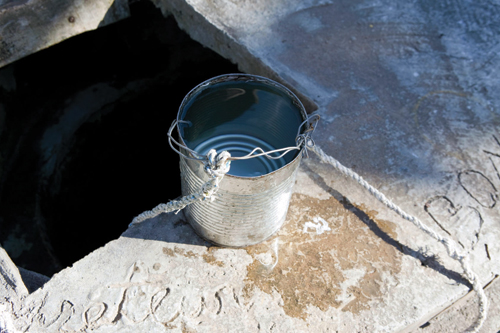 Monday all hell breaks loose in the hospital! There are lines of people seeking treatment. They are speaking French, Creole or broken English. Hospital forms are all in French, so the doctors and nurses get stymied in the process. There is a natural urge to want to take over; pushing away Haitian staff, falling back on what we think is the right method.
Monday all hell breaks loose in the hospital! There are lines of people seeking treatment. They are speaking French, Creole or broken English. Hospital forms are all in French, so the doctors and nurses get stymied in the process. There is a natural urge to want to take over; pushing away Haitian staff, falling back on what we think is the right method.
Tuesday people begin to blend. The interpreters help clarify the needs of patients. The language barrier is overcome with friendship, signs and limited language ability. The volunteers begin to see the way the Haitian staff does it week in and week out. All start to consider the greater needs and what can be done as a team. The best work is done under the circumstances for the most.
On Wednesday there is more blending and a meeting of the minds. Good work gets done by working together and coordinating and communicating. Doctors and staff are full of apology for they didn’t understand the massive problems and the limited ways to solve them. They are now free and wonderfully willing to offer their expertise in its Haitian context. Thursday, there is more teamwork and friendship. Harold then says that this “is where one will decide, if they will come back to Milot!”
Friday there is more work, reflections and advice for treating patients when the visiting crews leave. Plans are concluded with some patients and others will rely upon the good work of the Hospital. People start to say good-bye, buy souvenirs and start to prepare mentally for going home. Saturday is the day to
go home. There are hugs and wonderful good-byes, and memories created that you want to remember always and then you are gone!
 My sabbatical stay was a little over a month: so I was able to see things with a little more perspective than the week’s stay. I observed how doctors, nurses and volunteers of many sorts came and went, doing incredible work with imagination and innovation. Not being used to the lack of equipment, the availability of medications, working machinery, and the inability to communicate on a cultural as well as language basis, we all began to overcome these challenges through friendship, love and caring for each other. Through these efforts and the over-riding dedication to serve, we are all filled with God’s grace. It was amazing to see people give of themselves and apply their expertise and specific knowledge to the demands of a hospital day.
My sabbatical stay was a little over a month: so I was able to see things with a little more perspective than the week’s stay. I observed how doctors, nurses and volunteers of many sorts came and went, doing incredible work with imagination and innovation. Not being used to the lack of equipment, the availability of medications, working machinery, and the inability to communicate on a cultural as well as language basis, we all began to overcome these challenges through friendship, love and caring for each other. Through these efforts and the over-riding dedication to serve, we are all filled with God’s grace. It was amazing to see people give of themselves and apply their expertise and specific knowledge to the demands of a hospital day.
When we bond with one another we develop and broaden our relationships in ways that we don’t realize or understand. We make lasting connections and commitments that are filled with love for our fellows. When we share more fully of ourselves, no matter what our circumstances, God’s Spirit really enters
the equation.
Most of us are not particularly verbal about our faith or our spiritual natures these days. Most of us just go and do what we are called to do and don’t reflect too much on how it affects us. We just don’t have time in our hectic and demanding society. We might say a prayer or we might just wish, or be concerned for the safety and health of those we have encountered in Haiti, but we truly will never be the same for the experience.
Those that we have befriended, those we have encountered, those who do the work of medicine together, really fulfill the teachings of Jesus. Jesus emphasized that fulfillment is not so much in the thinking, the philosophizing or the letter of the law but he adamantly preached that we accept, take and use our opportunities to serve to the best of our ability. We are asked to take these talents and act, creating works that make a real difference in people’s lives. The more we include: the more we educate, the more we share, the greater the gift and the closer to God’s purpose we come. The plans made and those fulfilled, will always be discussed, debated and second guessed, but that is part of the genuine development and growth of this great mission. The more the people of Milot participate and begin to provide more and more of the leadership, the more the hospital will be a place that will remain for generations to come. God works in strange ways, His miracles to perform.
 What I saw unfold through the progression of some brief, local conflict and its aftermath and its good resolution was God’s work being done by all concerned whether they knew it or not! So we go on. We live and share, we plan and debate, as God works through us to build and to broaden a wonderful haven of hope and healing in the village of Milot.
What I saw unfold through the progression of some brief, local conflict and its aftermath and its good resolution was God’s work being done by all concerned whether they knew it or not! So we go on. We live and share, we plan and debate, as God works through us to build and to broaden a wonderful haven of hope and healing in the village of Milot.
When Ted, another volunteer and I left that Sunday, connecting on the Tortuga Airlines and then American to JFK, I was filled with the desire to return and do more: strengthened by my first experience. I’m hooked, I love that place. I’ll learn more of the language and figure out a way to do more significant service there. There is much to be done!
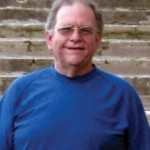 The Rev. David Hurst, an ordained U.C.C. Minister, is Pastor of Grace Union Church, Wilbraham, Massachusetts. He volunteered at the hospital during February, 2012.
The Rev. David Hurst, an ordained U.C.C. Minister, is Pastor of Grace Union Church, Wilbraham, Massachusetts. He volunteered at the hospital during February, 2012.
